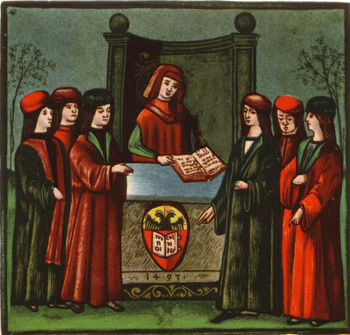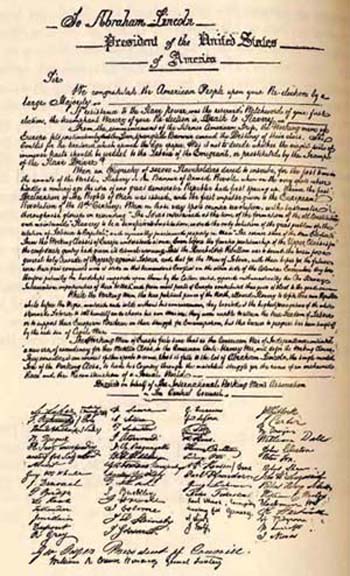American History
 |
 |
 |
 |
 |
 |
 |
Marx & Lenin Praise Lincoln
In the mid 19th century America heaved under the weight of a conflict that cost hundreds of thousands of lives. This war, the American Civil War, was not only significant for its impact on the Americans of those times, but also for the mark it left as one of most influential conflicts of modern history. Not only did Lincoln lead the North in a war to crush the South and its way of life, but his leadership became the American expression of a conflict that had been on-going in Europe since the 13th century.
The legacy of the Legists
In the 13th century the University of Bologna’s School of Law had become the principal center for studies in civil and canon law and attracted students from all over Europe. Bologna’s thought was based on ancient Roman Law and struggled to apply it to the nations of Christendom. This school, the Legists, believed that the outlying regions of a country or kingdom should be brought under the control of a powerful central government.
Under this principle the medieval mosaic of thousands of independent European political units began to be consolidated under the rule of absolute monarchs. It was the beginning of centralism, which would tragically lead to the republicanism of revolutionary France, evolve into the dictatorship of Napoleon and warp into the Socialism and Communism of the 19th and 20th centuries.
 French historian Alexis de Toqueville commented on the sad state of affairs when he said:
French historian Alexis de Toqueville commented on the sad state of affairs when he said:
“The old localized authorities disappear without either revival or replacement and everywhere the central government succeeds them in the direction of affairs. The whole of Germany, even the whole of Europe, presents in this respect the same picture. Everywhere men are leaving behind the liberty of the Middle Ages, not to enter into a modern brand of liberty, but to return to the ancient despotism.” (1)
This effort of centralism against the medieval Catholic principle of subsidiarity (that the smallest capable political unit should be, as much as it can, responsible for its own affairs) is a fundamental element in much of European history. It saw its expression also in the early days of the United States.
Initially, America attempted to construct a system in which regional authority was retained as much as possible, but this process slowly gave way to a more centralist system. Two distinct regions of the United States came to embody these conflicting systems; the centralized North and the decentralized South.
Lincoln: centralist & socialist
Lincoln’s war against Southern independence came to represent the centuries-old conflict of central authority vs. subsidiarity. Karl Marx and Friedrich Engels, who also advocated the supremacy of a powerful central government, recognized the significance of Lincoln’s war for their own cause and wholeheartedly threw their support behind the North. They closely followed the events of the war, commentating on it in letters and newspapers of the times.
Marx, indeed, affirmed: “The workingmen of Europe feel sure that, as the American War of Independence initiated a new era of ascendancy for the middle class, so the American anti-slavery war will do for the working classes. They consider it an earnest of the epoch to come that it fell to the lot of Abraham Lincoln, the single-minded son of the working class, to lead the country through the matchless struggle for the rescue of an enchained race and the reconstruction of a social world.” (2)
Under Lincoln, legitimate regional authority was crushed. Northern civilians and politicians who opposed his actions – or often even just questioned them – were imprisoned without trial. Beginning with the Legal Tender Act of 1862, Lincoln spearheaded the circulation of government printed greenbacks that were the ancestors of our modern currency. When in need of money, Lincoln’s government could simply print it.
His policies essentially became a prototype of the Socialist States of the following hundred years; bloating the federal government to monstrous proportions, drafting citizens to fight for the purposes of the State, printing currency to substitute real wealth, denying the constitutionally guaranteed rights of local governments and private citizens, and ignoring or imprisoning fellow politicians who questioned or opposed his actions.
 Socialists see their hero
Socialists see their hero
At the outbreak of war, organized labor declared itself for the North. The unabashedly socialist labor unions urged its members to sign up en masse to fight for the Northern cause that they believed would lead to the empowerment of labor.
Foreign socialists also flocked to enlist, with huge numbers of communist German immigrants, men who had fled Europe following their failed revolutions of 1848, signing up to fight with Lincoln’s armies. Following their centralist ideals, the socialists of the world, thus, took common cause to protect Lincoln and the North.
Following Lincoln’s re-election in 1864, Karl Marx wrote him a letter, signed by the leaders of the First International Workingman’s Association, congratulating Lincoln on his political victory and urging him to crush the ‘Slave Power’ of the South. Its first lines read:
“Sir, we congratulate the American people upon your re-election by a large majority. If resistance to the Slave Power was the reserved watchword of your first election, the triumphant war cry of your re-election is Death to Slavery. From the commencement of the titanic American strife, the workingmen of Europe felt instinctively that the star-spangled banner carried the destiny of their class.” (Full text here)
Communist praise
Lincoln’s legacy as a centralizer and enemy of regional independence would attract the praise of socialists and communists for over a century. Lenin cited the Civil War as a landmark in American history, writing to American workers to tell them that their country had a history of liberating wars that set the precedence to wage armed revolution against the propertied class.
Gorbachev, when trying to retain the Soviet Union, was also compared to Lincoln by many supporters of the communist cause. In China, Lincoln has been invoked as a model to impose Chinese control of Tibet. Lincoln’s centralist policies even attracted the admiration of the national socialist Hitler, who praised the Northern War effort as an assertion of strong central government.
Conclusion
 Lincoln’s war for the subjection of the South constitutes the American expression of the centuries-old conflict between organic government and central government. With the victory of the North, so applauded by Marx and other communists, one more remnant of medieval Catholic society was defeated.
Lincoln’s war for the subjection of the South constitutes the American expression of the centuries-old conflict between organic government and central government. With the victory of the North, so applauded by Marx and other communists, one more remnant of medieval Catholic society was defeated.
The Northern victory guaranteed the dominance of industry and central government over the traditions of the past, and it was Lincoln who installed the central government as an entity that would grow to consume all authority and define the limits of its own power.
In turn, this conquest was a landmark in the slow but steady degeneration of humanity that would culminate in the atheist and communist uprisings of the 20th century, paving the way for the culturally bankrupt and politically subjugated 21st century. Lincoln's war was an indispensable step in the march of the Revolution.

The legacy of the Legists
In the 13th century the University of Bologna’s School of Law had become the principal center for studies in civil and canon law and attracted students from all over Europe. Bologna’s thought was based on ancient Roman Law and struggled to apply it to the nations of Christendom. This school, the Legists, believed that the outlying regions of a country or kingdom should be brought under the control of a powerful central government.
Under this principle the medieval mosaic of thousands of independent European political units began to be consolidated under the rule of absolute monarchs. It was the beginning of centralism, which would tragically lead to the republicanism of revolutionary France, evolve into the dictatorship of Napoleon and warp into the Socialism and Communism of the 19th and 20th centuries.

In the University of Bologna, above, the Legists aimed to destroy regional autonomy
“The old localized authorities disappear without either revival or replacement and everywhere the central government succeeds them in the direction of affairs. The whole of Germany, even the whole of Europe, presents in this respect the same picture. Everywhere men are leaving behind the liberty of the Middle Ages, not to enter into a modern brand of liberty, but to return to the ancient despotism.” (1)
This effort of centralism against the medieval Catholic principle of subsidiarity (that the smallest capable political unit should be, as much as it can, responsible for its own affairs) is a fundamental element in much of European history. It saw its expression also in the early days of the United States.
Initially, America attempted to construct a system in which regional authority was retained as much as possible, but this process slowly gave way to a more centralist system. Two distinct regions of the United States came to embody these conflicting systems; the centralized North and the decentralized South.
Lincoln: centralist & socialist
Lincoln’s war against Southern independence came to represent the centuries-old conflict of central authority vs. subsidiarity. Karl Marx and Friedrich Engels, who also advocated the supremacy of a powerful central government, recognized the significance of Lincoln’s war for their own cause and wholeheartedly threw their support behind the North. They closely followed the events of the war, commentating on it in letters and newspapers of the times.
Marx, indeed, affirmed: “The workingmen of Europe feel sure that, as the American War of Independence initiated a new era of ascendancy for the middle class, so the American anti-slavery war will do for the working classes. They consider it an earnest of the epoch to come that it fell to the lot of Abraham Lincoln, the single-minded son of the working class, to lead the country through the matchless struggle for the rescue of an enchained race and the reconstruction of a social world.” (2)
Under Lincoln, legitimate regional authority was crushed. Northern civilians and politicians who opposed his actions – or often even just questioned them – were imprisoned without trial. Beginning with the Legal Tender Act of 1862, Lincoln spearheaded the circulation of government printed greenbacks that were the ancestors of our modern currency. When in need of money, Lincoln’s government could simply print it.
His policies essentially became a prototype of the Socialist States of the following hundred years; bloating the federal government to monstrous proportions, drafting citizens to fight for the purposes of the State, printing currency to substitute real wealth, denying the constitutionally guaranteed rights of local governments and private citizens, and ignoring or imprisoning fellow politicians who questioned or opposed his actions.

The letter to Lincoln signed by Karl Marx
and other lead socialists
At the outbreak of war, organized labor declared itself for the North. The unabashedly socialist labor unions urged its members to sign up en masse to fight for the Northern cause that they believed would lead to the empowerment of labor.
Foreign socialists also flocked to enlist, with huge numbers of communist German immigrants, men who had fled Europe following their failed revolutions of 1848, signing up to fight with Lincoln’s armies. Following their centralist ideals, the socialists of the world, thus, took common cause to protect Lincoln and the North.
Following Lincoln’s re-election in 1864, Karl Marx wrote him a letter, signed by the leaders of the First International Workingman’s Association, congratulating Lincoln on his political victory and urging him to crush the ‘Slave Power’ of the South. Its first lines read:
“Sir, we congratulate the American people upon your re-election by a large majority. If resistance to the Slave Power was the reserved watchword of your first election, the triumphant war cry of your re-election is Death to Slavery. From the commencement of the titanic American strife, the workingmen of Europe felt instinctively that the star-spangled banner carried the destiny of their class.” (Full text here)
Communist praise
Lincoln’s legacy as a centralizer and enemy of regional independence would attract the praise of socialists and communists for over a century. Lenin cited the Civil War as a landmark in American history, writing to American workers to tell them that their country had a history of liberating wars that set the precedence to wage armed revolution against the propertied class.
Gorbachev, when trying to retain the Soviet Union, was also compared to Lincoln by many supporters of the communist cause. In China, Lincoln has been invoked as a model to impose Chinese control of Tibet. Lincoln’s centralist policies even attracted the admiration of the national socialist Hitler, who praised the Northern War effort as an assertion of strong central government.
Conclusion

Lincoln idolized by the American Communist party, 1939
The Northern victory guaranteed the dominance of industry and central government over the traditions of the past, and it was Lincoln who installed the central government as an entity that would grow to consume all authority and define the limits of its own power.
In turn, this conquest was a landmark in the slow but steady degeneration of humanity that would culminate in the atheist and communist uprisings of the 20th century, paving the way for the culturally bankrupt and politically subjugated 21st century. Lincoln's war was an indispensable step in the march of the Revolution.
- Apud Bertrand de Jouvenel, On Power,Indianapolis: Liberty Classics, 1993, p. 285.
- Karl Marx and Friedrich Engels, Collected Works, Vol. 19 (New York: International Publishers, 2009) 281

Posted July 1, 2016
______________________
______________________








